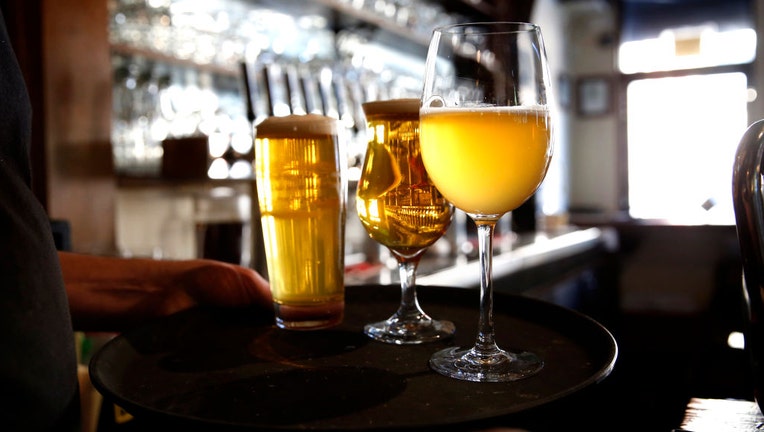Beer shortage could be brewing based on climate change, study suggests

FILE-Glasses of beer are served at a restaurant and bar in San Francisco, Ca. (Photo By Michael Macor/The San Francisco Chronicle via Getty Images)
The effects of climate change on the world are well documented, but a new study takes a closer look at the impact it could have on beer supplies and its taste.
In a report published on Oct. 10 in Nature Communications, a weekly science journal, European researchers imply that warmer and drier weather may add more bitterness to beer.
The report predicts hops harvest might dip by 18% by 2050.
RELATED: Bud Light sales fall further, Modelo extends lead as best-selling US beer
According to the study, researchers explained that the remaining hops could also lack the materials to give beer products their specific taste. Beer is the third most widely consumed beverage globally after water and tea.
The team collected data by examining hop production from 1971–1994 and 1985-2018 in Germany, the Czech Republic and Slovenia. The team determined high temperatures shifted the hop growing season by 13 days from 1970 to 2018.
Researchers tested the effects of changing weather conditions on aromatic hops by assessing the difference in rain and temperature from ideal weather conditions during the hops growing season.
RELATED: Why is Oktoberfest in September? It has to do with the weather
The team estimated that a hop harvest would decline between 4%-18% by 2050 and a continued decline of 20%-30% in the acids in the hops required for bitterness for beer.
The study notes that hops harvests have dropped by 19% since 1995, and earlier ripening has also contributed to higher acidity in beer.
Is climate change affecting hop production for U.S. breweries?
While the study didn't discuss the effect of climate change on U.S. beer production, Chuck Skypeck, the technical brewing projects director at the Brewers Association, tells FOX Television Stations what the organization is doing to address this matter in the nation's brewing industry.
The Brewers Association is a trade group representing nearly 6,000 breweries in the U.S. that get most of their hops from American producers.
"U.S. breweries use different aromatic hops compared to European breweries. Many of the hops in the U.S. are grown in Washington State, Skypeck says. "Work has been underway for decades with hop production in the U.S. related to climate change."
"The USDA has two hop geneticists, and they've worked on breeding resilient hops. Merchants that buy from the growers asked them to harvest less hops because of a limited number of inventory. So far in 2023, there have been greater harvest yields (meaning how much is grown) for hops," Skypeck notes.
Skypeck explains that "beer sales have been soft lately, and more hops have been grown than needed. There are good harvest years and bad harvest years. Brewers are facing inflationary pressures like everyone else and pricing of barley and aluminum cans and glass bottles, and carbon dioxide which makes bubbles in beer."
"The majority of beer brewed in the US is with American hops, it won’t affect the quality. Geneticists in Germany, Slovenia, the Czech Republic and the U.S. are working with manufacturers on a new variety of hops.for years to address climate change."
Separately, Skypeck notes that a decline in hop production wouldn’t affect the quality of beer or lead to a shortage of the beverage in the U.S.
"The majority of beer brewed in the U.S. uses American hops and it won’t affect the quality. Geneticists in Germany, Slovenia, the Czech Republic and the U.S. have been working on a new variety of hops for years to address the matter of climate and the quality to improve it. Quality can be more about flavor. But change doesn’t mean a change in quality, just the beer’s flavor."
U.S. breweries have expressed their concerns on climate change with the Brewery Association and Skypeck shares what the company is doing to offer support.
"We talked to our brewers and geneticists and growers all the time about the growing conditions of hops and barley. We publish a quarterly report to inform our members of what’s going on, and we help our supply chain partners find solutions. We worked with growers, merchants and scientists to determine if there is a sustainable supply of hops for American brewers."
In addition to the climate factors, the study noted other facets that can affect the aroma of hops, including the health of the hop, irrigation systems, the age of the hop, habitat conditions, and hop growth related to agricultural technology and fertilization.
This story was reported from Washington, D.C.

